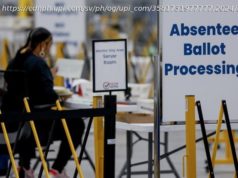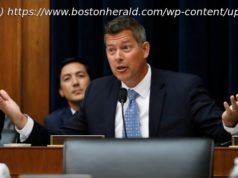Not everyone will be waving
As President Donald Trump prepares to travel to the U. K. on June 3 for the second time as commander-in-chief, thousands of Britons are arranging a rude welcome.
The divisive president is not popular across the Atlantic, and certainly not in left-leaning London, where he will spend the bulk of his three-day visit. Trump may finally be getting the pomp and prestige of the British state visit, but—as during his working visit last summer—there will be many Britons keen to spoil the big occasion.
However, not everyone will be waving “Dump Trump” placards, nor gathering under the famous inflatable “Trump Baby.” There are more than 200,000 Americans living in the U. K., a proportion of which are avowed Republicans. Like their stateside GOP comrades, some may have struggled to get behind the president’s pugnacious style, but will be celebrating next week’s reaffirmation of the “special relationship” nonetheless.
The U. K. arm of the Republicans Overseas organization is the country’s most prominent GOP-aligned group, with around 1,000 members. While “never-Trumpers” gather in the center of the city, Republicans Overseas members will be meeting at a private club close to Buckingham Palace—the exact location is being kept under wraps until closer to the event—to celebrate the president’s visit, which will preempt the 75th anniversary of the D-Day landings during the Second World War on June 6.
Sarah Elliott, the chair of Republicans Overseas U. K., told Newsweek that the event would primarily focus on celebrating D-Day and the Anglo-American alliance, which she believes is “as important as ever.”
Of course, there will be no ignoring Trump’s visit, but for Elliott the significance of the D-Day anniversary and state visit should outshine partisan opposition to the president’s presence.
“Our perspective is—whether you like him or not—he is the U. S.’s top diplomat, and these kinds of events are incredibly important for the special relationship and for the strength of our western democracies,” she explained. “We’re exceptionally close allies, and I think that needs to be put into perspective, especially around the anniversary of D-Day in this country.”
Elliott, a Londoner who calls Virginia home but has lived in the U. K. for the past six years, said she and her fellow Republicans “are proud of the president coming and representing the United States,” regardless of his “unconventional style.”
Elliott understands why Trump’s approval ratings in the U. K. are so low—around 28 percent according to a Pew Research Center poll from last October. “His whole character and demeanor are the very opposite of the English,” she said. “His style, his rhetoric, his speech, the way he goes about things are absolutely the opposite of the way the British like to see their statesmen. And I get that.”
But Elliott suggested next week’s protesters would do well to remember that the office is bigger than the man. “He’ll be gone in six years—two years or six years—but the United States will still be here… They need to think about how they treat presidents regardless of whether they like them or not, because that does impact the relationship between our countries.”
“This isn’t just about him,” Elliott stressed. “He is the president of the United States—the U. K.’s best ally—and he should be afforded that respect.”
Christopher Schuyler is a 59-year-old lawyer originally from New York City. Married to a British woman, he now lives near the town of Huddersfield in northern England—his second stint residing in the U. K.
Schuyler said “it seems to be that maybe half of the people up here” are in favor of Trump. Despite last year’s vociferous opposition to the president’s visit, Schuyler still believes “the British people get the gold medal for courtesy, tact, diplomacy—I’ve never ever seen a more polite group of people in my life.”
Nonetheless, he feels some frustration that anti-Trump Britons are so vocally opposed to domestic political goings-on in America. “I am American, and no matter where I go, if I want to insinuate myself into local politics, I’m told or I’m made to feel that I shouldn’t do that,” he said.
Home
United States
USA — Political Donald Trump U. K. Visit: Meet the Republicans Who Will Be Celebrating...






